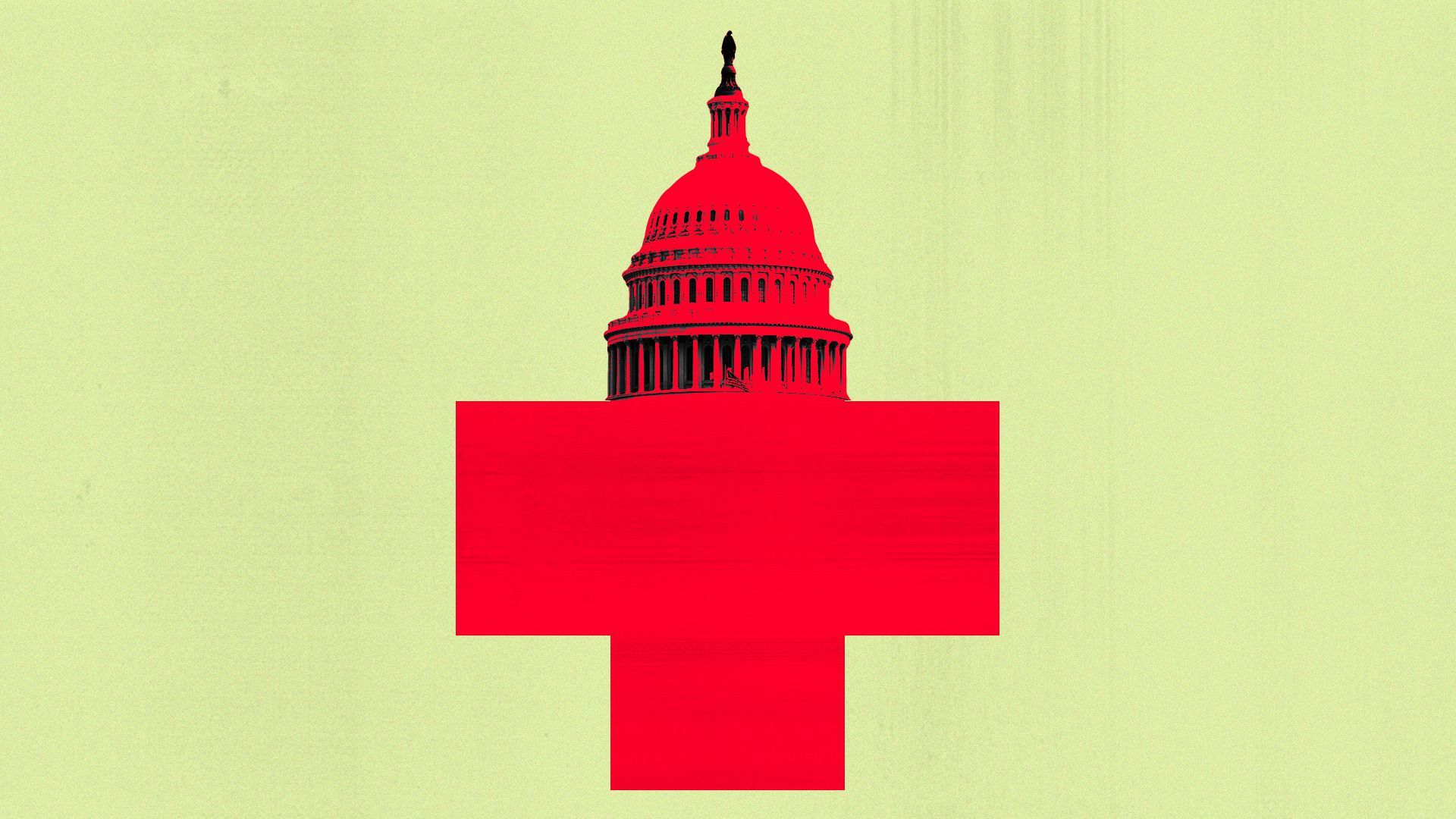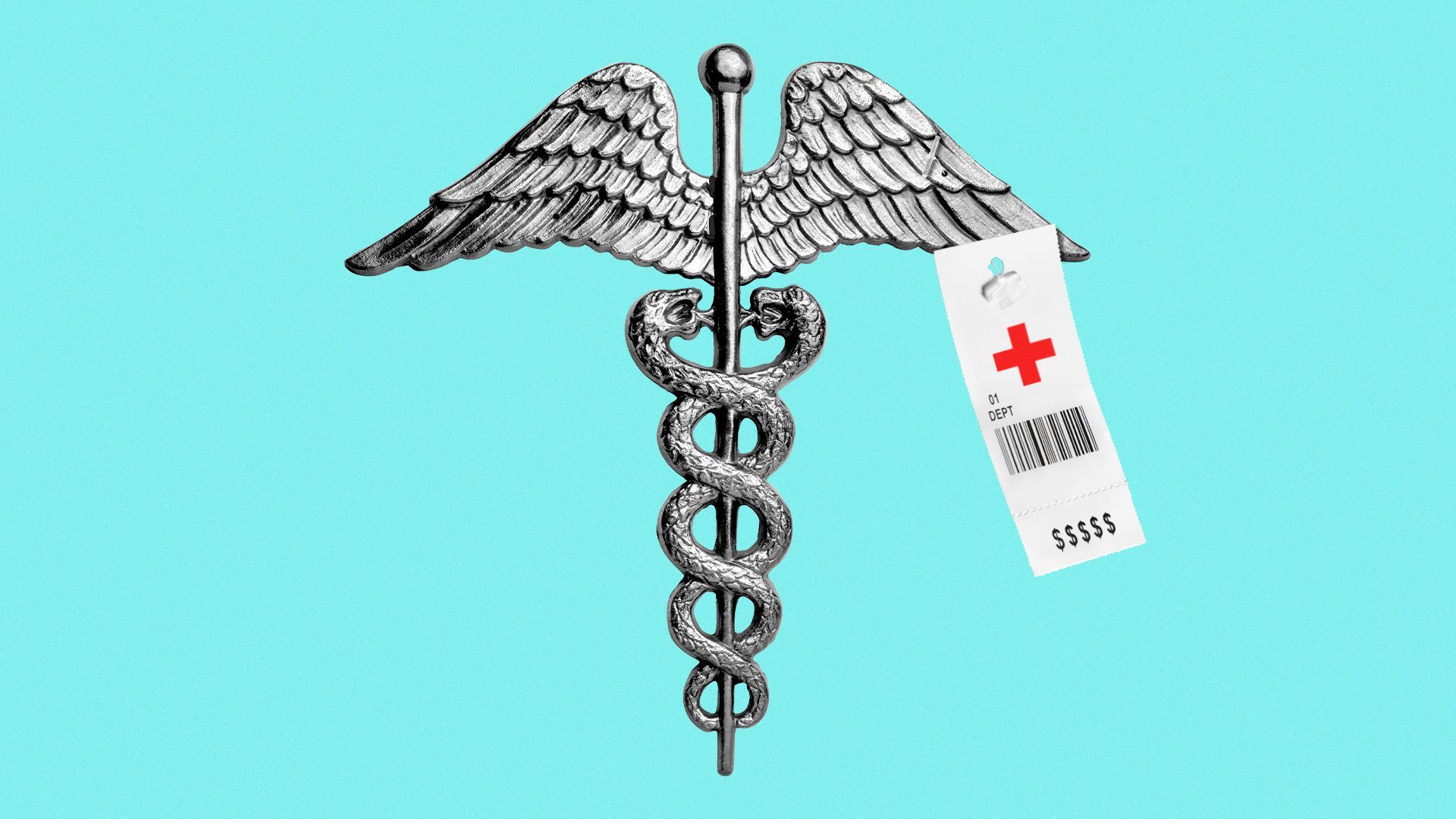| | | | | | | Presented By PhRMA | | | | Axios Vitals | | By Tina Reed · Oct 28, 2022 | | Happy Friday, Vitals readers. Today's newsletter is 1,054 words or a 4-minute read. 🎙Listen in: Axios' Victoria Knight joined the latest episode of KHN's "What the Health" podcast to talk about pressing matters, including what to watch in the midterms. | | | | | | 1 big thing: Hospitals test Congress' goodwill on Medicare relief |  | | | Illustration: Shoshana Gordon/Axios | | | | Hospitals are pleading with Congress to postpone looming Medicare pay cuts, citing what they say has been an extraordinarily difficult year. - But that unified message belies the fact that hospitals' financial situations vary significantly, and experts say some facilities would be just fine without lawmakers' help, Axios' Caitlin Owens and Arielle Dreher report.
Why it matters: The industry has not been scrutinized as much as other health groups, despite being the primary driver of rising medical costs. But if Congress does play hardball in the coming months, it could deal a crippling blow to some facilities or create warped financial incentives for others. Driving the news: The American Hospital Association, which represents the industry writ-large, and the Federation of American Hospitals — which represents for-profit hospitals — sent letters this week to congressional leaders that outline their policy asks for the lame-duck session. - Both groups asked Congress to delay a scheduled 4% year-end cut in Medicare payments to hospitals and providers, along with other various policy items. FAH is also asking for Congress to address an expected reduction in what Medicare pays physicians next year.
- These items alone would likely cost the federal government tens of billions of dollars.
The big picture: Hospitals asking Congress for money or to delay payment cuts is nothing new. In recent years, such lobbying took place against the backdrop of skyrocketing prices paid by private insurers to hospitals. - Meanwhile, facilities serving vulnerable populations have struggled to survive.
- At the same time: "Those that are often the most powerful hospitals that are earning very large margins, their margins might fall for a while, but they'll still be very profitable," said Paul Ginsburg, a former MedPAC vice chair and a senior fellow at the USC Schaeffer Center for Health Policy and Economics.
Go deeper. |     | | | | | | 2. GOP pins COVID on lab leak | | The COVID-19 pandemic was most likely the result of a lab leak, Senate health committee Republicans concluded in an analysis released Thursday. Why it matters: The finding lays the groundwork for investigative hearings if the GOP flips control of the chamber and, potentially, more adversarial interactions with federal scientists who maintain coronavirus likely jumped from an animal host to humans — a type of zoonotic spillover seen in other outbreaks like SARS. What they're saying: The document acknowledges zoonotic spillover from animals into humans is still a possibility. - But it concludes "substantial evidence" suggests the pandemic was the result of a "research-related incident" at a lab in Wuhan, China, that benefited, in part, from National Institutes of Health funding. Other experts have called this a possibility, but investigations have been stymied by Chinese officials.
- "The lack of NIH grant oversight may have contributed to the horrible introduction of COVID-19 to the world and it is imperative for NIH to start cooperating and help us fix the institutional culture that has proven to be incapable of self-regulation," Sen. Roger Marshall, R-Kan., said in a statement.
Flashback: An unclassified intelligence report into COVID's origin released last year was inconclusive, stating the two dominant theories — lab leak or naturally transmitted from an animal — remain plausible. What to watch: Republicans who may soon be committee chairs have vowed to investigate the origins of the virus, as well as Centers for Disease Control communications about pandemic school closures and mask mandates. |     | | | | | | 3. Redefining "never events" for hospitals |  | | | Illustration: Natalie Peeples/Axios | | | | When is it acceptable for a hospital to send debt collectors after low-income patients? The answer should be "never," argues a new article published in JAMA Health Forum. Why it matters: Health systems around the country — particularly nonprofits — have come under fire in recent years for aggressively pursuing debt collections, and even suing, patients who can't pay their bills. - At least 40% of Americans surveyed earlier this year said they struggled to pay medical bills or were paying off medical debt, according to The Commonwealth Fund.
The big picture: The authors framed the issue using the National Quality Forum's "never events" framework that came out 20 years ago. That defined patient safety events, like leaving a sponge inside a patient, as events that should "never" happen. - "How do we take something that's routine, something that's considered a necessary harm or cost of doing business, and change it to something that's no longer accepted?" Adam Beckman of Harvard Medical School and a co-author of the report told Axios.
- He pointed to one recent instance reported by the New York Times about the 21-hospital non-profit Providence hiring debt collectors to pursue patients who should have qualified for free care.
Between the lines: Other proposed "never events" at hospitals, they said, should include not falling short on community benefit spending, never paying their employees less than a living wage, never flouting price transparency laws and avoiding racially segregated care. Yes, but: This comes at a time when hospitals of all stripes have been reporting financial hardship caused by the pandemic. The authors acknowledge those challenges but said that's why clarifying principles are needed. - They've also received suggestions for other "never events," they said, including that hospitals should "never" disrespect medical trainees or refuse to take Medicaid patients.
💡 What other ideas do you have for what should be considered "never events" in health care? Reply to this email, or email me, with your responses and I'll share some of the best answers next week. |     | | | | | | A message from PhRMA | | How insured Americans navigate unclear insurance coverage | | |  | | | | According to new findings, insured Americans favor policy solutions that improve their ability to navigate and access their care while lowering their out-of-pocket costs. An example: Tackling the barriers introduced by insurers and middlemen like pharmacy benefit managers. Read more. | | | | | | ⚡️4. Health industry lightning round | | 💻 Teladoc saw its shares jump after the telehealth firm reported a boost in membership and allayed "fears of inflation hitting its consumer-focused mental health unit," Reuters reports. 📉 Community Health Systems saw a boost in shares Thursday despite posting losses of $42 million in the third quarter as it reported improvement indicators such as higher surgical volumes and better cost containment. Both CHS and Universal Health Services said they expect labor costs to continue dropping, Axios' Arielle Dreher reports. |     | | | | | | 5. Dog of the week |  | | | Eddie. Photo: Doug Wachter | | | | Meet Eddie, an 8-year-old cockapoo-turned-panda who lives with humans Doug and Nicole Wachter outside Atlanta. - Eddie is the granddog of Bob Wachter from the University of California, San Francisco, who's been a prolific tweeter and guide when it came to navigating COVID throughout the pandemic.
🎃 While Eddie sure looks cute in that Halloween costume, I was told he gets a bit ticked off about the whole thing. I'm sure he'll earn some treats for wearing it! |     | | | | | | A message from PhRMA | | Americans want policy reforms that improve their insurance | | |  | | | | Did you know 39% of insured Americans say they don't understand what's covered by their insurance? Health insurance coverage should be predictable and transparent, and insured Americans agree. Learn more from PhRMA's latest Patient Experience Survey report. | | | | Thanks for reading, and thanks to senior editor Adriel Bettelheim and senior copy editor Bryan McBournie for the edits. Please ask your friends and colleagues to sign up. |  | | Why stop here? Let's go Pro. | | | | | | Axios thanks our partners for supporting our newsletters. If you're interested in advertising, learn more here.
Sponsorship has no influence on editorial content. Axios, 3100 Clarendon Blvd, Arlington VA 22201 | | | You received this email because you signed up for newsletters from Axios.
Change your preferences or unsubscribe here. | | | Was this email forwarded to you?
Sign up now to get Axios in your inbox. | | | | Follow Axios on social media:    | | | | | |








No comments:
Post a Comment